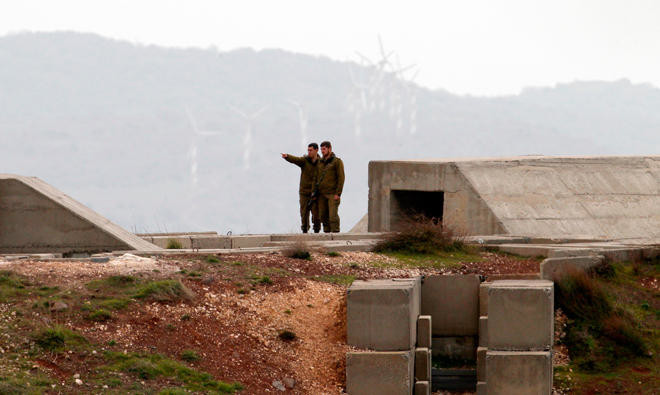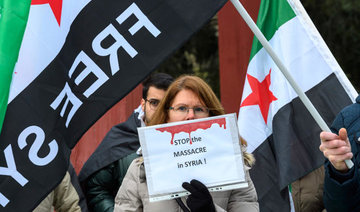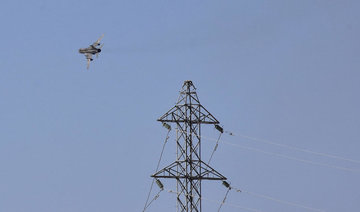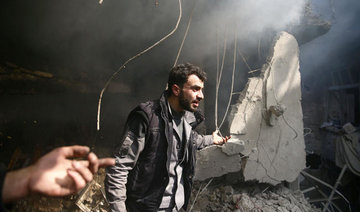DAMASCUS/JERUSALEM: Israel will face “more surprises” should it again attack Syrian territory, Damascus said on Tuesday, after Syria’s air defenses shot down an advanced Israeli warplane during the fiercest flare-up between the old foes in 36 years.
The F-16 jet was hit over northern Israel on Saturday as it returned from a raid on a Syrian position blamed for launching an Iranian-made drone across the border. Iran is supporting President Bashar Assad in Syria’s near seven-year civil war.
“Have full confidence the aggressor will be greatly surprised, because it thought this war — this war of attrition Syria has been exposed to for years — had made it incapable of confronting attacks,” Assistant Foreign Minister Ayman Sussan said.
“God willing, they will see more surprises whenever they try to attack Syria,” Sussan said during a Damascus news conference.
The downed F-16 was the first warplane Israel has lost to enemy fire since its 1982 Lebanon war. Its two-man crew survived, with injuries, after bailing out of the stricken jet.
Israel retaliated by destroying around half of Syria’s anti-aircraft batteries, according to an initial assessment shared with Reuters by an Israeli official who requested anonymity.
Israel has said it will press ahead with missions in Syria, where it has launched scores of sorties against suspected arms transfers to Iranian-sponsored Lebanese Hezbollah guerrillas.
“There are no limitations, and nor do we accept any limitations,” Defense Minister Avigdor Lieberman told reporters during a tour of Israel’s border with Syria and Lebanon.
“We will continue to defend our vital security and other interests. And I would like to paraphrase the well-known saying: ‘This is not the time to bark, this is the time to bite.’“
Tehran’s involvement in Syria, including the deployment of Iran-backed forces near the Israeli-occupied Golan Heights, has alarmed Israel. It has also has accused Iran of building precision-guided missile factories for Hezbollah in Lebanon.
Syria and Hezbollah celebrated the F-16 shoot-down as a blow to Israeli military superiority. Israel’s Army Radio said on Tuesday that investigators believed pilot error — rather than Syrian capabilities — were mainly at fault for the F-16’s failure to evade what was probably an aged SA-5 missile.
Israeli military spokesman declined to comment on that report, saying the investigation was ongoing.
Saturday’s incident stirred up further questions in Israel about the effectiveness of a coordination mechanism set up with Russia, which has also been reinforcing and arming Assad’s army.
Russian President Vladimir Putin responded to the flare-up by urging Israeli Prime Minister Benjamin Netanyahu to avoid escalation in Syria. Moscow said on Monday it did not have information to support Israel’s allegation about an Iranian military presence in the site bombed for launching the drone.
Zeev Elkin, a Russian-speaking Israeli cabinet minister who serves as Netanyahu’s interpreter in the talks with Putin, defended the coordination mechanism on Tuesday as granting Israel “freedom of action in the skies above Lebanon and Syria.”
“I don’t think the Russians ever pledged that they would take military action against the Iranians and the Syrians for us,” Elkin told Israel Radio.
“We are going one-on-one against the Syrians. We don’t need assistance from the Russians. We know how to deal with Syrian anti-aircraft fire, as everyone ultimately saw.”
Damascus warns Israel of ‘more surprises’ in Syria
Damascus warns Israel of ‘more surprises’ in Syria

Syria authorities say torched 1 million captagon pills

DAMASCUS: Syria’s new authorities torched a large stockpile of drugs on Wednesday, two security officials told AFP, including one million pills of captagon, whose industrial-scale production flourished under ousted president Bashar Assad.
Captagon is a banned amphetamine-like stimulant that became Syria’s largest export during the country’s more than 13-year civil war, effectively turning it into a narco state under Assad.
“We found a large quantity of captagon, around one million pills,” said a balaclava-wearing member of the security forces, who asked to be identified only by his first name, Osama, and whose khaki uniform bore a “public security” patch.
An AFP journalist saw forces pour fuel over and set fire to a cache of cannabis, the painkiller tramadol, and around 50 bags of pink and yellow captagon pills in a security compound formerly belonging to Assad’s forces in the capital’s Kafr Sousa district.
Captagon has flooded the black market across the region in recent years, with oil-rich Saudi Arabia a major destination.
“The security forces of the new government discovered a drug warehouse as they were inspecting the security quarter,” said another member of the security forces, who identified himself as Hamza.
Authorities destroyed the stocks of alcohol, cannabis, captagon and hashish in order to “protect Syrian society” and “cut off smuggling routes used by Assad family businesses,” he added.
Syria’s new Islamist rulers have yet to spell out their policy on alcohol, which has long been widely available in the country.
Since an Islamist-led rebel alliance toppled Assad on December 8 after a lightning offensive, Syria’s new authorities have said massive quantities of captagon have been found in former government sites around the country, including security branches.
AFP journalists in Syria have seen fighters from Islamist group Hayat Tahrir Al-Sham (HTS) set fire to what they said were stashes of captagon found at facilities once operated by Assad’s forces.
Security force member Hamza confirmed Wednesday that “this is not the first initiative of its kind — the security services, in a number of locations, have found other warehouses... and drug manufacturing sites and destroyed them in the appropriate manner.”
Maher Assad, a military commander and the brother of Bashar Assad, is widely accused of being the power behind the lucrative captagon trade.
Experts believe Syria’s former leader used the threat of drug-fueled unrest to put pressure on Arab governments.
A Saudi delegation met Syria’s new leader Ahmed Al-Sharaa in Damascus on Sunday, a source close to the government told AFP, to discuss the “Syria situation and captagon.”
Jordan in recent years has also cracked down on the smuggling of weapons and drugs including captagon along its 375-kilometer (230-mile) border with Syria.
Jordan says 18,000 Syrians returned home since Assad’s fall

AMMAN: About 18,000 Syrians have crossed into their country from Jordan since the government of Bashar Assad was toppled earlier this month, Jordanian authorities said on Thursday.
Interior Minister Mazen Al-Faraya told state TV channel Al-Mamlaka that “around 18,000 Syrians have returned to their country between the fall of the regime of Bashar Assad on December 8, 2024 until Thursday.”
He said the returnees included 2,300 refugees registered with the United Nations.
Amman says it has hosted about 1.3 million Syrians who fled their country since civil war broke out in 2011, with 650,000 formally registered with the United Nations.
Lebanon hopes for neighborly relations in first message to new Syria government

- Lebanon’s Iran-backed Hezbollah played a major part propping up Syria’s ousted President Bashar Assad through years of war
- Syria’s new Islamist de-facto leader Ahmed Al-Sharaa is seeking to establish relations with Arab and Western leaders
DUBAI: Lebanon said on Thursday it was looking forward to having the best neighborly relations with Syria, in its first official message to the new administration in Damascus.
Lebanese Foreign Minister Abdallah Bou Habib passed the message to his Syrian counterpart, Asaad Hassan Al-Shibani, in a phone call, the Lebanese Foreign Ministry said on X.
Lebanon’s Iran-backed Hezbollah played a major part propping up Syria’s ousted President Bashar Assad through years of war, before bringing its fighters back to Lebanon over the last year to fight in a bruising war with Israel – a redeployment which weakened Syrian government lines.
Under Assad, Hezbollah used Syria to bring in weapons and other military equipment from Iran, through Iraq and Syria and into Lebanon. But on Dec. 6, anti-Assad fighters seized the border with Iraq and cut off that route, and two days later, Islamist militants captured the capital Damascus.
Syria’s new Islamist de-facto leader Ahmed Al-Sharaa is seeking to establish relations with Arab and Western leaders after toppling Assad.
Iraqi intelligence chief discusses border security with new Syrian administration

BAGHDAD: An Iraqi delegation met with Syria’s new rulers in Damascus on Thursday, an Iraqi government spokesman said, the latest diplomatic outreach more than two weeks after the fall of Bashar Assad’s rule.
The delegation, led by Iraqi intelligence chief Hamid Al-Shatri, “met with the new Syrian administration,” government spokesman Bassem Al-Awadi told state media, adding that the parties discussed “the developments in the Syrian arena, and security and stability needs on the two countries’ shared border.”
















